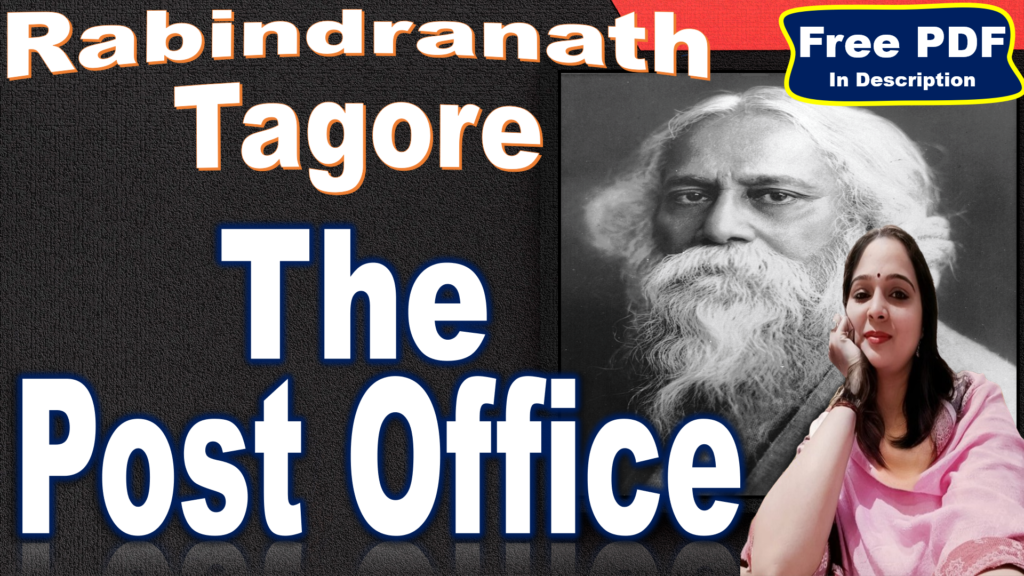
CHARACTERS
Amal
Amal, the central character in Rabindranath Tagore’s play “The Post Office”, is a symbol of innocence, purity, and the eternal soul. Despite being confined to his room due to illness; Amal’s character is full of life, curiosity, and imagination.
1. Innocence and Purity Amal’s name itself signifies innocence and original purity. He embodies the innocence of childhood, untouched by the harsh realities of the world. His interactions with the world are marked by a sense of wonder and curiosity, reflecting his innocent nature.
2. Imagination and Curiosity Amal’s imagination is boundless. Despite his physical confinement, his mind is free to explore the world beyond his room. His imagination leads him to envision himself in the world of squirrels and parrots. His curiosity about the world is insatiable, and he eagerly engages with everyone he meets, learning about their lives and experiences.
3. Hope and Optimism Amal is a symbol of hope and optimism. Despite his circumstances, he remains hopeful about receiving a letter from the king. His anticipation of the letter symbolizes his hope for a connection with the outside world and his optimism about the future.
4. Love of Life Amal has a strong love for life. He finds joy in the simplest of things and cherishes every interaction he has. His love for life is evident in his eagerness to learn about the world and his ability to find happiness in the smallest of things.
5. Connection with Others Despite his confinement, Amal forms connections with various characters in the play. He befriends the Dairyman, Watchman, Headman, and many others. His friendly nature and genuine interest in others draw people to him, and he forms deep connections with them.
6. Longing for Freedom Amal longs for freedom from his physical constraints. He yearns to explore the world outside his room and experience life to the fullest. His longing for freedom is symbolized by his anticipation of the letter from the king, which he believes will bring him the freedom he desires.
7. Spiritual Significance Amal’s character has a deep spiritual significance. He represents the eternal soul longing for liberation. His death is not seen as an end but as a form of deliverance from the physical world. His journey reflects the spiritual journey of the soul seeking union with the divine.
In conclusion, Amal is a beautifully crafted character that embodies innocence, hope, and the eternal soul. His journey in “The Post Office” is a poignant exploration of life, death, and the human spirit. Through Amal, Tagore presents a unique perspective on the human condition, making “The Post Office” a timeless masterpiece in the realm of literature.
Madhav
Madhav is the adoptive father of Amal. He is a caring and protective figure, deeply concerned about Amal’s health. He follows the advice of the village physician and keeps Amal confined within a small room. His character represents the well-meaning but often restrictive adult world that seeks to protect children but in doing so, may limit their freedom. Madhav’s character also highlights the theme of parental love and concern.
Gaffer/Fakir
Gaffer, also known as Fakir in the play, is a spiritual wanderer. He has renounced worldly ways and lives on public charity. He understands and sympathizes with Amal. His conversations with Amal about the many lands he has visited fuel Amal’s imagination and desire for freedom. His character represents the wisdom of experience and the spirit of adventure.
Sudha
Sudha is a young flower seller. She is a friend of Amal and often interacts with him. Her character brings a touch of innocence and simplicity to the play. Her interactions with Amal highlight the beauty of simple pleasures and the joy of friendship. Sudha’s character also underscores the theme of human connection and companionship.
The Village Physician
The village physician is responsible for Amal’s medical care. He advises Madhav to keep Amal confined to his room as his contact with the wind and sun is considered harmful. His character represents the practical and often limiting perspective of the adult world. The village physician’s character also underscores the theme of professional duty and responsibility.
The Royal Physician
The Royal Physician is sent by the King to attend to Amal. He brings the message of deliverance. His character symbolizes hope and the possibility of liberation. The Royal Physician’s character also underscores the theme of divine intervention and mercy.
The King’s Herald
The King’s Herald announces the arrival of the King. His character adds a touch of anticipation and excitement to the play. The King’s Herald’s character also underscores the theme of royal authority and power.
Themes
Death and Deliverance “Death and Deliverance” is indeed a central theme in Rabindranath Tagore’s play “The Post Office”. The protagonist, Amal, is a young boy who is confined to his room due to illness. Despite his physical limitations, Amal’s spirit remains free, full of curiosity and wonder. He longs to explore the world beyond his room and yearns for freedom and connection with the outside world.
The theme of death is explored through Amal’s eventual passing. However, his death is not portrayed as an end, but rather as a form of liberation. This perspective on death is unique and thought-provoking. It suggests that death is not something to be feared, but rather a form of deliverance from the physical constraints of life.
Dr. B.C. Chakravorty states that “Deliverance has to be sought and won, not in the other world but in this world, not after death, but in this very life. This is the spiritual realism of Rabindranath Tagore and this is what distinguishes him from other mystic poets and dramatists.”. This perspective underscores Tagore’s belief in the potential for spiritual liberation within the confines of earthly existence.
Liberation and Freedom: The theme of liberation and freedom is central to the play. Amal, the protagonist, is physically confined due to his illness, but his spirit remains free. His yearning for liberation from his physical constraints is evident in his interactions with the passersby at his window and his dreams of receiving a letter from the King. This theme resonates with the audience as it reflects the universal human desire for freedom and liberation. It also highlights the dichotomy between physical confinement and spiritual freedom, suggesting that while the body may be confined, the spirit remains free. This theme is particularly poignant given the historical context in which the play was written and performed. At a time when India was under British colonial rule, the theme of liberation and freedom would have resonated deeply with Indian audiences. The play suggests that true freedom comes not from physical liberation, but from the liberation of the spirit.
Human Connection: The play explores the human desire for connection. Despite his physical confinement, Amal establishes connections with various characters through his window. These interactions highlight the importance of human connection and the power of communication. This theme resonates with the audience as it reflects the universal human need for connection and companionship. It also underscores the idea that even in isolation, we can still form meaningful connections with others. This theme is particularly relevant in today’s world, where many people experience feelings of isolation and loneliness. The play suggests that human connection is essential for our well-being and happiness.
Hope and Optimism: The play is imbued with a sense of hope and optimism. Despite his illness and confinement, Amal remains hopeful and optimistic. He dreams of receiving a letter from the King and imagines a life of freedom beyond his room. His hope and optimism are infectious, touching the lives of everyone he interacts with. This theme serves as a reminder of the power of hope and optimism in the face of adversity. It suggests that even in the most difficult circumstances, we can still find reasons to be hopeful and optimistic. This theme is particularly relevant in today’s world, where many people are facing challenges and difficulties. The play suggests that hope and optimism can help us to overcome these challenges and to find joy and meaning in our lives.
Social Commentary: The play also presents a social commentary on class structure through the servants who surround Amal during his illness. It explores the restrictions and prohibitions of contemporary Hindu society. This theme provides a critique of the social norms and structures that limit individual freedom and potential. It suggests that these social structures are arbitrary and unjust, and that they should be challenged and reformed. This theme is particularly relevant in today’s world, where issues of social justice and equality are of paramount importance. The play suggests that we should strive for a society where everyone is treated with dignity and respect, regardless of their social status or background.
The Power of Imagination: The play highlights the power of imagination. Amal’s imagination allows him to transcend his physical limitations and connect with the world outside his room. His dreams and fantasies bring joy and meaning to his life. This theme underscores the idea that imagination is a powerful tool that can help us overcome challenges and expand our understanding of the world. This theme is particularly relevant in today’s world, where creativity and innovation are highly valued. The play suggests that we should nurture and cultivate our imagination, as it can open up new possibilities and opportunities for us.
Symbolism
The Post Office: The post office is a central symbol in the play. It represents hope and a connection to the outside world for Amal. It also symbolizes the power of communication and the importance of human connection. The post office stands as a symbol for a Temple of God which transmits the prayer of men to God and God’s grace to men. It is the Post Office that stands as a symbol, as an agent of communication, where messages are received and delivered. Its functions are not always fully projected, but are symbolically suggested and indirectly extended. It stands for the tensions revealed in human life, because the expectations of man, whether small or great, sometimes satisfy, and sometimes disappoint him. The Post Office is a symbol for life: it almost becomes a mystical emblem radiating a message from the world of those invisible and occult hierarchies of experience which transcend time and space.
Amal’s Window: Amal’s window is another significant symbol in the play. Despite his physical confinement, Amal establishes connections with various characters through his window. These interactions highlight the importance of human connection and the power of communication. His window serves as his only connection to the outside world, symbolizing his longing for freedom and his desire to be a part of the world beyond his room. It is through this window that Amal observes the world, dreams of receiving a letter from the King, and interacts with passersby.
The Bell: The bell in the play is a symbol of time and its passage. The sound of the bell marks the passing of time and serves as a reminder of the transient nature of life. It also symbolizes the call of the King, representing authority and power. The bell’s sound is a music to hear for Amal. He likes to hear it when his time comes. The bell strikes when it is midday to have lunch and his uncle has to be back at work after his meal is over and his aunt would fall asleep with Ramayana in hand. His bell sounds to tell the people that time waits for none. Amal imagines to fly with time to a faraway mysterious land known to none.
Fairy Tales: Fairy tales in the play symbolize hope, dreams, and the power of imagination. They transport Amal to a world of fantasy and magic, providing him with an escape from his physical confinement. The fairy tales also serve as a metaphor for the transformative power of stories and the ability of imagination to create new realities. They represent the world of possibilities that exist beyond the confines of reality. Through these fairy tales, Amal is able to imagine a different life for himself, one that is filled with adventure, freedom, and joy.
The Letter: The letter is the most important suggestive symbol in the play. It comes from a distant mysterious land bringing a message from someone whom we hold dear to us. It is a sort of bridge between the known and the unknown. To Amal’s mind the postman is a specially privileged person, for he establishes communion between the distant and near.
The Curd Seller: The curd seller symbolises death. The curd-seller has already left a jar of curds and promised “child wedding” with his niece. The curd seller promises to come back later and when she disappears, a troop of boys pass in the street.
Death: Although The Post Office ends in death and the state physician brings the message of deliverance, a good deal of the drama is also about the earth, about the joys which Amal wants to find, by freeing himself from the limitations imposed by his uncle. It must be remembered that the death of Amal in the play is no physical death but has a symbolic significance. Death represents the end of the spiritual bondage of the soul.
Amal: Amal, the protagonist of the play, is a symbol of the eternal soul that is trapped within the physical confines of the body. His name, which signifies innocence and original purity, is reflective of his character. Despite his physical illness and confinement, Amal’s spirit remains unbroken. His curiosity, imagination, and wonder are boundless, making him a beacon of hope and positivity. He observes the world from his room’s window and is fascinated by it, symbolizing the human spirit’s yearning for freedom and exploration. His interactions with passersby, his dreams, and his longing for freedom reflect his innocent and imaginative nature. Despite his physical limitations, Amal’s spirit soars high, embodying the human spirit’s resilience and the power of imagination.
Madhav: Madhav, who has adopted Amal, symbolizes the well-meaning but often restrictive adult world that seeks to protect children but in doing so, may limit their freedom. He is a caring and protective figure, deeply concerned about Amal’s health. He follows the advice of the village physician and keeps Amal confined within a small room. His character represents the well-meaning but often restrictive adult world that seeks to protect children but in doing so, may limit their freedom. Madhav’s character also highlights the theme of parental love and concern.
Gaffer/Fakir: Gaffer, also known as Fakir in the play, is a spiritual wanderer. He has renounced worldly ways and lives on public charity. He understands and sympathizes with Amal. His conversations with Amal about the many lands he has visited fuel Amal’s imagination and desire for freedom. His character represents the wisdom of experience and the spirit of adventure.
Sudha: Sudha, the daughter of a flower-seller, symbolizes innocence and simplicity. She is a friend of Amal and often interacts with him. Her character brings a touch of innocence and simplicity to the play. Her interactions with Amal highlight the beauty of simple pleasures and the joy of friendship. Sudha’s character also underscores the theme of human connection and companionship.
The Village Physician: The village physician symbolizes the practical and often limiting perspective of the adult world. He is responsible for Amal’s medical care. He advises Madhav to keep Amal confined to his room as his contact with the wind and sun is considered harmful. His character represents the practical and often limiting perspective of the adult world.
The Royal Physician: The Royal Physician symbolizes hope and the possibility of liberation. He is sent by the King to attend to Amal. He brings the message of deliverance. His character symbolizes hope and the possibility of liberation.
The King’s Herald: The King’s Herald symbolizes royal authority and power. He announces the arrival of the King. His character adds a touch of anticipation and excitement to the play. The King’s Herald’s character also underscores the theme of royal authority and power.





